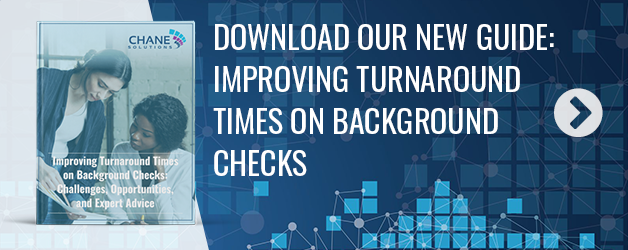Slow background checks are frustrating, to say the least. All you want to do is fill your open positions and get on with your company’s business, and you’re stuck waiting for the results of a criminal record search, employment or education verification, a drug test, or all of the above.
What’s the hold-up?
Our last article outlined what you can expect in terms of turnaround time for background checks — assuming everything is running smoothly. In today’s article, we’ll look at the factors that can slow down a background check.
As you’ll see, many of them are within your control, or they can be solved by working with a background screening firm with the knowledge, experience, and technology to help you optimize the pre-employment screening process.
We’ll organize our list into three categories:
- Inefficiencies on the front end.
- Issues with applicant or employer response time or engagement.
- Research challenges.
On the Front End
By “the front end,” we mean the hiring process itself. The following delay-causing issues have to do with how your organization interacts with job applicants and gets the ball rolling on background checks.
1. Not Getting the Right Information from Candidates
Consumer reporting agencies need to be able to identify your job candidates precisely to get accurate information from county courts, schools, former employers, and other sources. This is especially important for applicants with common names.
Background screening firms will often ask for identifiers such as name, date-of-birth, social security number, and maiden name. If they fail to request this critical information, or candidates fail to provide it, turnaround time may be significantly slower.
2. Failure or Delays Getting Authorization (Consent)
Federal law forbids running a background check on a job applicant without first informing them of your intention to do so and securing their written permission. Responsible background screening providers will not begin their work until you have demonstrated compliance with this legal requirement. So, any delays in getting authorization from your candidates will result in longer turnaround times.
3. Inefficient Paper-Based Processes
Who even has a printer at home anymore?
While mobile-friendly, completely digital background screening platforms exist, many employers continue to ask candidates to complete, sign, and return physical forms.
Sometimes, this means uploading the forms through an online portal. In worst-case scenarios, it involves faxing, an ancient technology with which most modern job applicants are unfamiliar.
Paper-based systems are both inefficient and inconvenient. Digital systems, on the other hand, allow applicants to complete their forms rapidly from anywhere, using nearly any device. (Digital solutions are also useful for tracking chain-of-custody for drug tests.)
Applicant/Employer Response Time and Engagement
The next two factors come into play after the background screening process has been initiated with the job applicant.
4. Not Giving the CRA Direct Access to the Candidate
From time to time, background screening providers may need to request further information from job candidates. In these cases, the agency should be allowed to communicate with the candidate directly. Otherwise, the situation can devolve into a mess of unreturned voice messages and overlooked emails.
5. The Applicant or Employer Taking Excessively Long to Respond
When background screeners do have questions, it’s important for job applicants or employers to respond promptly. Both parties need to be aware of and actively engaged with the background screening process.
Research Problems
The remaining issues on this list occur during the research phase. This is when background screening providers search for relevant information in county court records, from colleges and universities, from previous employers, and elsewhere.
6. Court Clerk and Jurisdiction Delays
When there is no public access portal available, researchers must submit requests directly to court clerks. Some clerks move quicker than others. They are not beholden to a standard turnaround time; each county operates independently.
In other cases, the clerk is not necessarily at fault, but the jurisdiction itself. Either way, the outcome is the same: waiting.
7. Slow Third-Party Response
As we wrote in our last article, it’s sometimes necessary to directly contact schools and employers to verify a candidate’s past work or education. As with court clerks, some of these third-party organizations are more responsive than others.
8. Archaic Records
Most organizations have switched to digital records for a reason. They take up much less space, they’re easier to organize, and calling up a record is simply a matter of running a quick online search. But the farther you go back in time, the more likely you are to encounter old-fashioned paper records stored in file cabinets (remember those?).
This happens most often with educational institutions, many of which have yet to fully digitize their archives. For example, if a job applicant graduated from college in the 1970s, you may have to wait a little longer than expected for understaffed personnel to conduct manual searches.
9. No Public Access Portal
Background screening is actually faster than ever these days, thanks to online portals that provide public access to centralized collections of criminal, employment, and education records. But such systems are not yet universal, and where they don’t exist, background screening firms must send manual researchers to find information.
(Typically, the more experienced a company is with a particular jurisdiction, school, or employer, the faster their manual research will be.)
10. The Background Check Provider’s Processes
Finally, the responsibility for some background screening slowdowns can be placed at the feet of the background check provider. The agency may be stuck on out-of-date, inefficient processes, they may fail to follow up with candidates in a timely manner, or they may deal in such a large volume of requests that they can’t react nimbly when problems arise.
Whatever the case, when time is of the essence, you want to be confident your background screening partner values efficiency and accuracy as much as you do. For a customized background screening solution that respects your need for urgency, contact Chane today.



Leave a comment